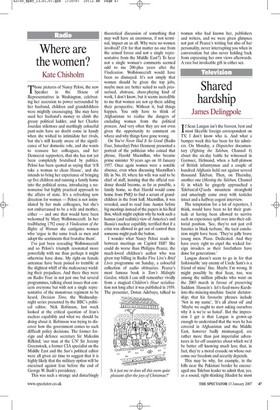Where are the women?
Kate Chisholm Those pictures of Nancy Pelosi, the new Speaker in the House of Representatives in Washington, celebrating her accession to power surrounded by her husband, children and grandchildren were mightily encouraging. She may have used her husband's money to climb the greasy political ladder, and her Charles Jourdan stilettoes and startlingly colourful pant-suits have no doubt come in handy when she wished to intimidate her rivals, but she's still keenly aware of the significance of her domestic role, and she wants to reassure her colleagues, and her Democrat supporters, that she has not yet been completely brutalised by politics. Pelosi has been quoted as saying that 'it'll take a woman to clean House', and she intends to bring her experience of bringing up five children and running a family home into the political arena, introducing a nononsense but highly practical approach to the affairs of state. It's a refreshing new direction for women — Pelosi is not intimidated by her male colleagues, but she's not embarrassed to be a wife and mother, either — and one that would have been welcomed by Mary Wollstonecraft. In her trailblazing 1792 essay A Vindication of the Rights of Woman she castigates women who 'argue in the same track as men and adopt the sentiments that brutalise them'.
I've just been rereading Wollstonecraft and so Pelosi's triumph resonated more powerfully with me than perhaps it might otherwise have done. My right-on female antennae have been poised to tremble at the slightest whiff of the maleocracy wielding their prejudices. And there they were on Radio Four in not just one but several programmes, talking about issues that concern everyone but with not a single representative of the monstrous regiment to be heard. Decision Time, the Wednesdaynight series presented by the BBC's political editor, Nick Robinson, last week looked at the critical question of Iran's nuclear capability and what we should be doing about it. Robinson was trying to discover how the government comes to such difficult policy decisions. The former foreign and defence secretary Sir Malcolm Rifkind, 'our man at the UN' Sir Jeremy Greenstock, a former CIA specialist on the Middle East and the Sun's political editor were all given air time to suggest that it is highly likely that the military option will be exercised against Iran before the end of George W. Bush's presidency.
This was such a strange and disturbingly theoretical discussion of something that may well have an enormous, if not terminal, impact on us all. Why were no women involved? (Or for that matter no one from the armed forces and not a single representative from the Middle East?) To hear not a single woman's comments seemed odd to me 200-plus years after the Vindication. Wollstonecraft would have been so dismayed. It's not simply that women should be given the top jobs, maybe men are better suited to such pressurised, abstruse, chess-playing kind of work, I don't know, but it seems incredible to me that women are not up there adding their perspective. Without it, bad things happen. You only have to think of Afghanistan to realise the dangers of excluding women from the political process. And very often they are not even given the opportunity to comment on where and why things have gone wrong.
On You've Never Had It So Good (Radio Four, Saturday) Peter Hennessy presented a portrait of the politician who coined that phrase, Harold Macmillan, who became prime minister 50 years ago on 10 January 1957. Once again women were a notable absence, even when discussing Macmillan's life in No. 10, where his wife was said to be chief of staff, insisting that the official residence should become, as far as possible, a family home, so that Harold would come home from PMQ to find a scrum of grandchildren in the front hall. Macmillan, it was revealed, used to read Jane Austen before big meetings instead of the papers in his Red Box, which might explain why he took such a human (and realistic) view of America's and Russia's nuclear capability, terrified that if a crisis was allowed to get out of control then someone might push the button.
I wonder what Nancy Pelosi reads inbetween meetings on Capitol Hill? She could do worse than Philippa Pearce, the much-loved children's author who was given top billing in Radio Five Live's Brief Lives programme on Sunday, a colourful collection of audio obituaries. Pearce's most famous book is Tom's Midnight Garden, which I can still remember vividly from a magical Children's Hour serialisation not long after it was published in 1959. The presenter, Dotun Adebayo, talked to women who had known her, publishers and writers, and we were given glimpses not just of Pearce's writing but also of her personality, never interrupting you when in conversation but also never holding back from expressing her own views afterwards. A rare but invaluable gift in either sex.






















































 Previous page
Previous page